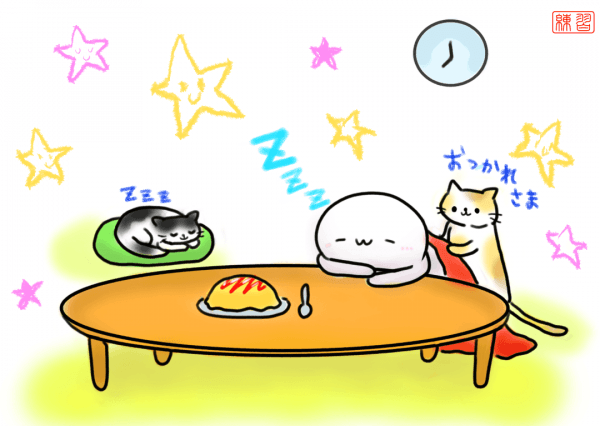Without A..ing

夕飯を食べずに寝て仕舞った。
I fell asleep without eating dinner.
56
先生は、生徒の意見を聞かずに一人で決めました。
The teacher decided by herself, without listening to the students' opinions.
0
45
お父さん、今朝着替えずに仕事に行って仕舞った
My father went to work this morning without changing his clothes!
0
62
朝ご飯を食べずに学校に行った。
I went to school without eating breakfast.
0
13
私は間違わずに英語を話せない。
I cannot speak English without making some mistakes.
0
26
学生は何も言わずに行って仕舞った。
The student left without saying anything.
0
26
ノックをせずに私の部屋に入ってくるな。
Don't come into my room without knocking.
0
28
卵を割らずにオムレツは作れない。
You can't make an omelet without breaking eggs.
2
15
電気は消さずに行って下さい。
Please go without turning out the lights.
0
11
彼は帽子を被らずに出かけた。
He went out without a hat.
0
9
彼女は一言も言わずに部屋から出た。
She left the room without saying a word.
0
11
彼女は死ぬ迄初恋のことを忘れずに居た。
Until the day she died, she did not forget her first love.
0
9
忘れずに安全ベルトを閉めなさい。
Don't forget to fasten your safety belts.
0
0
親の承諾を得ずに行うなど、勝手極まる行動です。
It couldn't be more selfish behavior than to act without the approval of your parents.
0
0
無理をせずに自分の体力に応じた運動をする様にして下さい。
Please try to exercise in line with your own stamina and not overdo it.
0
7
困った時は、一人で考えずに誰かに相談すればいいよ。
When you're in a bind, it's good to not think by yourself and consult with someone.
0
Getting the sentences
Construction
(Elements in parentheses are optional.)
Dict. Form
Conjugated
あげる
あげず
おす
おさず
かう
かわず
かく
かかず
くる
こず
しぬ
しなず
Dict. Form
Conjugated
とる
とらず
もつ
もたず
よぶ
よばず
よむ
よまず
いそぐ
いそがず
する
せず
Basic Examples:
帰らずに (without going home)
Where this grammar is found
Grammar usage notes
Because this is grammar from classical Japanese, it is used mainly in writing.
although this could be said to be more classical grammar, it is not as old as ぬ.
where as ずに is mainly used in writing it can be used in spoken, where as ぬ is almost entirely only used within writing.
where as ずに is mainly used in writing it can be used in spoken, where as ぬ is almost entirely only used within writing.
A variant of this grammar is to use it with adjective.
"Event B (adjective) happens/exists without event A"
姉は 化粧を せずに きれいなんだ。
My sister is beautiful without putting make-up.
the も particle, ~さえ, ~でも, and the likes could be used as an emphasis.
…化粧を せずに も きれいだ。
...is beautiful even without putting make-up.
"Event B (adjective) happens/exists without event A"
姉は 化粧を せずに きれいなんだ。
My sister is beautiful without putting make-up.
the も particle, ~さえ, ~でも, and the likes could be used as an emphasis.
…化粧を せずに も きれいだ。
...is beautiful even without putting make-up.
Questions/Discussion
Nothing posted yet!
